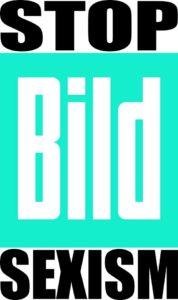StopBildSexism is a campaign, which is fighting for the abolition of the “Bild girl”, a series of scantily clad women published in the daily German tabloid “Bild”. Below an interview with co-organiser Penelope Kemekenidou about her personal motivation to start the campaign, her team’s source of inspiration and her view on whether having a female editor-in-chief at Bild makes her job as a campaigner easier or more difficult.
What is StopBildSexism? What are you fighting for?
Our campaign started as a sister campaign of No more page 3 – an initiative against the naked “girls” in the British tabloid “Sun”. Our campaign, in turn, is directed at the “Bild” newspaper. The “Bild girl” and the abolition of the associated images are of a symbolic character: Our objective is notcensorship, but to raise awareness that what is really being sold here is not sex, but sexism! It is not about sex when only young, white women, who correspond to common beauty ideals are objectified: Bild newspaper sells sexism by presenting men as doers and women as objects – a theme recurrent throughout the newspaper, also beyond the “Bild Girl”.
What triggered your decision to launch the campaign? Who inspired you?
I already mentioned “NoMorePage 3” as a main trigger. However, I feel that I must also add that we frequently underestimate the power of the media and the role it plays in the formation of public opinion. In fact, role models and power structures reproduced by the media on a daily basis contribute to their existence and reinforcement. In the context of sexism, types of media such as “Bild” make women believe that they are passive objectives and that their bodies are open to the world to be judged. Studies prove that sexist images influence women’s self-image in a negative way and foster violence against women.
We want to raise awareness about this situation with our campaign; Bild’s antiquated portrayal of men and women deserves no place in modern society, even if the editor-in-chief of Bild, Tanit Koch, claims that society’s image of men and women is indeed modern.
Why are you specifically targeting “Bild”? After all, there are many other media in Germany which embrace sexism?
“Bild” is the newspaper with the highest circulation in Europe, it is therefore interesting for us for two reasons: Firstly, it can actually shape society. Secondly, it also has a symbolical value – if we manage to influence this medium, we can also influence other types of media.
You already mentioned that Tanit Koch became “Bild”’s first editor-in-chief in January 2016. Has this made your work easier or more difficult?
Initially it appears more difficult to challenge a woman, but our work did not actually change. Persons belonging to an oppressed group have always been used to justify oppression. If someone with the same gender, the same skin colour or religion works against a group being oppressed because of these very characteristics, the oppression quickly takes on the character of an “opinion” rather than being what it really is. In our specific case we can say that both women and men can be sexist! We are fair enough to treat Ms Koch the same way we treated her predecessor, Kai Diekmann.
Apart from “No more page 3”, are there similar campaigns against sexism in tabloids in other European countries?
There are more and more great campaigns against sexism in the media! We do not know about a specific campaign targeting tabloids alone, but we would be delighted to find out!
Activists are often confronted with trolls and haters. How do you deal with this?
We are a team of 20 people and are almost in constant contact, specifically our social media team. It is very difficult, above all in the beginning, to deal with trolls and haters. But you quickly realise when it makes no sense to get involved emotionally. If there is something specific, we post it in our internal group and support each other. Then it can happen that a troll becomes a joke and rather makes for our amusement than anything else!
“No more page 3” succeeded in 2015 and the Sun dropped the feature. How long will it take for “Bild”?
Well, of course this mainly depends on Ms Koch. From our side we have planned a lot of activities for 2016 and are confident that there will be some developments![:or]StopBildSexism ist eine Kampagne zur Abschaffung des „Bild-Girls“. Ein Interview mit Co-Organisatorin Penelope Kemekenidou über die Motivation für ihr Engagement, Vorbilder und die Frage, ob eine Bild-Chefredakteurin ihre Arbeit erleichtert oder erschwert.
Was ist StopBildSexism? Wofür setzt ihr euch ein?
Unsere Kampagne begann als Schwesterkampagne von No more page 3 – einer Kampagne gegen die nackten „girls“ in der britischen Sun. Mit unserer Kampagne richten wir uns an die Bild-Zeitung. Das Bild-Girl und dessen Abschaffung hat einen symbolischen Charakter: Was wir damit beabsichtigen ist nicht Zensur, sondern dass ein Bewusstsein dafür geschaffen wird, dass hier in erster Linie nicht Sex verkauft wird – sondern Sexismus. Es ist nicht Sex, wenn die Objektifizierung sich allein auf weiße junge Frauen bezieht, die dem gängigen Schönheitsideal entsprechen: Die Bild-Zeitung verkauft Sexismus, indem sie Männer als Macher, und Frauen als Objekte darstellt, und das auch über das Bild-Girl hinaus.
Was war der Auslöser für euer Engagement? Gab es Vorbilder?
NoMorePage 3 habe ich ja schon erwähnt, hier als Zusatz: Die Macht der Medien auf unsere Meinungsbildung wird viel zu oft unterschätzt – jedoch sind die Rollenbilder und Machtstrukturen, die wir tagtäglich von den Medien vorgesetzt bekommen, maßgeblich an der Bildung ebendieser beteiligt. Im Kontext von Sexismus wird von Medien wie der Bild-Zeitung Frauen suggeriert, sie seien passive Objekte deren Körper zur Beurteilung für die ganze Welt offensteht. Studien belegen, dass diese Bilder Frauen negativ in ihrem Selbstbild beeinflussen, sowie Gewalt gegenüber Frauen fördern.
Wir wollen mit unserer Kampagne ein Bewusstsein dafür schaffen; so ein antiquiertes Geschlechterbild hat in unserer Zeit nichts mehr verloren – auch wenn die Bild-Chefredakteurin Tanit Koch der Meinung ist, dass wir schon längst ein modernes Geschlechterbild hätten.
Warum wendet sich eure Kampagne gerade gegen die Bild-Zeitung – schließlich gibt es noch viele andere Medien in Deutschland, die auf Sexismus setzen?
Die Bild-Zeitung ist die auflagenstärkste Zeitung Europas, sie ist daher für uns in zweierlei Hinsicht interessant: Zum einen hat sie einen tatsächlichen Einfluss auf die Gesellschaft. Zum anderen hat sie auch symbolischen Wert – denn wenn wir es schaffen, dieses Medium zu beeinflussen, so hat das auch einen Einfluss auf andere Medien.
Tanit Koch, die du vorhin schon erwähnt hast, ist seit Januar 2016 die erste weibliche Chefredakteurin der Bild-Zeitung. Macht das eure Arbeit einfacher oder schwieriger?
Es ist anfangs scheinbar schwieriger gegen eine Frau zu argumentieren – im Grunde bleibt die Arbeit aber dieselbe. Es wurden schon immer gerne Figuren aus der unterdrückten Gruppe verwendet, um Unterdrückung zu rechtfertigen. Wenn jemand mit demselben Geschlecht, derselben Hautfarbe oder Religion gegen eine Gruppe arbeitet, die wegen dieser Merkmale unterdrückt wird, so erscheint die Unterdrückung schnell eher Meinung als als das, was sie wirklich ist. In unserem speziellen Fall können wir nur sagen: Jeder und jede kann Sexist sein und wir sind so fair und behandeln Frau Koch genauso wie wir ihren Vorgänger, Herrn Diekmann behandelt haben.
Gibt es neben der „No more page 3“-Initiative noch ähnliche Kampagnen gegen Sexismus in Boulevardzeitungen in anderen europäischen Ländern?
Es gibt viele tolle Kampagnen, die sich mit Sexismus in Medien auseinandersetzen – und es werden immer mehr! Eine spezielle gegen Boulevardzeitungen ist uns jetzt nicht bekannt, aber wir würden uns auf jeden Fall freuen.
Aktivistinnen sind häufig mit Trollen und Hatern konfrontiert. Wie geht ihr damit um?
Wir sind ein fast 20-köpfiges Team und sind fast immer in Kontakt, vor allem unser Social Media Team. Gerade am Anfang ist es schwer mit Trollen und Hatern umzugehen – jedoch merkt man schnell, wann es keinen Sinn macht sich emotional einzubringen. Falls jedoch einmal mehr los sein sollte, posten wir das in unserer internen Gruppe und unterstützen uns gegenseitig. Da wird so ein Troll auch gern mal zur Lachnummer und dient mehr unserem Amüsement als sonst irgendwas.
„No more page 3“ hatte im Januar 2015 Erfolg und die Sun ließ das Feature fallen. Wie lange wird es bei der Bild-Zeitung noch dauern?
Das hängt natürlich in erster Linie von Frau Koch ab. Wir jedenfalls haben für 2016 schon viel geplant und sind zuversichtlich, dass sich da so einiges tun wird.



![Summer School for Young Feminist of Europe: AGORA 2015 – Poletna šola mladih feministk Evrope: AGORA 2015 [EN/SI]](https://www.youngfeminist.eu/wp-content/uploads/2015/10/images-1-150x141.jpg)

![Rightist women against human rights – Rechte Frauen gegen Menschenrechte [EN/DE]](https://www.youngfeminist.eu/wp-content/uploads/2016/04/rtswn6x-150x150.jpg)
Average Rating